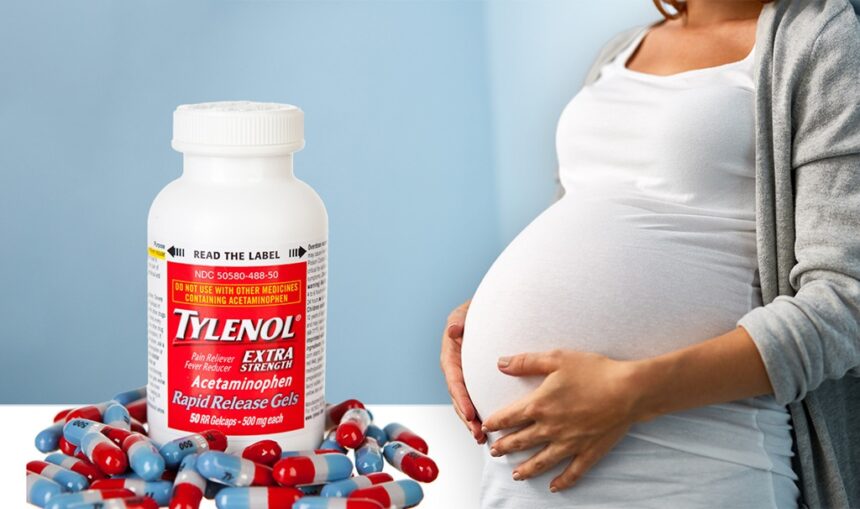WASHINGTON D.C – On 22 September, President Donald Trump stood beside Health and Human Services Secretary Robert F. Kennedy Jr. at the White House and criticized America’s “autism epidemic,” pinning much of the blame on Tylenol, the popular pain reliever found in nearly every home.
With Dr Mehmet Oz, Administrator for Centers for Medicare & Medicaid Services, also present, Trump urged expectant mothers to avoid Tylenol, warning, “taking Tylenol is not good — I’ll say it: It’s not good.”
The White House pledged to revise drug labelling and launch a nationwide information campaign, referring to an upcoming report from the Department of Health and Human Services, which Kennedy claims ties acetaminophen (Tylenol’s active ingredient) taken in pregnancy to sharp rises in autism spectrum disorder (ASD) and attention-deficit/hyperactivity disorder (ADHD).
This announcement sent Kenvue, the company behind Tylenol, into a spin, with shares falling by 8% in just one day. The comments triggered outrage among doctors and researchers. Kennedy’s report intends to highlight environmental triggers like acetaminophen and suggests leucovorin, a chemotherapy drug, as a possible treatment.
Tylenol Study Explained
Scientists disagree, saying the evidence is mixed, unconvincing and fails to prove Tylenol causes autism. Dr Alison Singer, president of the Autism Science Foundation, put it plainly: “This isn’t solid science; it’s speculation posing as policy.” She stressed that genetics and early brain development, not medication, drive autism.
The claims against Tylenol stem from a group of studies exploring whether acetaminophen — used by over half of pregnant women worldwide for symptoms like headaches and fever — might subtly affect the developing brain. Outside the US, acetaminophen is called paracetamol.
It remains the only non-prescription pain medicine the US Food and Drug Administration officially considers safe during pregnancy, since drugs like ibuprofen can reduce amniotic fluid and cause harm to the unborn baby.
With autism diagnoses rising sharply (from one in 150 children in 2000 to one in 31 today), researchers are paying closer attention to everyday exposures, including widely used medications.
The debate heated up in 2018, when Johns Hopkins University followed almost 1,000 newborns in the Boston Birth Cohort. Babies with the highest cord blood levels of acetaminophen were up to 3.6 times more likely to be diagnosed with autism and nearly three times more likely to be diagnosed with ADHD later on.
“We found higher exposure increased the risk,” said lead scientist Dr Yiyi Zhang. Similar patterns appeared in the Nurses’ Health Study II, which follows over 100,000 women. There, long-term Tylenol use in pregnancy is linked to a 20-30% rise in autism risk for children.

2.5 Million Children Studied
By 2024, a Swedish study published in the Journal of the American Medical Association (JAMA) looked at 2.5 million children. It found that 1.53% of those exposed to acetaminophen before birth developed autism by age 10, compared to 1.33% in those not exposed.
For ADHD, the rates were 2.87% and 2.46%. There was also a small increase in intellectual disability (0.82% vs 0.70%). Dr Viktor H. Ahlqvist of Karolinska Institutet said, “The risks we saw are small but concern us given how common acetaminophen use is.”
However, this changed when the Swedish research team compared siblings — some exposed to acetaminophen, some not — from the same families. This approach controls for genetic and environmental factors. When doing so, the risk almost vanished.
Hazard ratios fell to near 1 0.98 for autism, 0.98 for ADHD, and 1.01 for intellectual disability. “Factors such as the mother’s illness, smoking or social situation account for much of the association,” explained Ahlqvist. “Pregnant women taking more acetaminophen often have other conditions, which themselves increase neurodevelopmental risks.”
Other large studies in Japan and Sweden in 2025, including work by Drexel University, reached the same conclusion. Both used sibling comparisons and found no direct link. Drexel epidemiologist Dr Brian Lee observed, “People who use acetaminophen in pregnancy differ in many ways from those who don’t — including income, body weight, and mental health history — in ways that normal statistics cannot fully correct for.”
Still, a 2025 review from Mount Sinai, published in BMC Environmental Health and cited heavily by Kennedy, gathered 46 studies using the Navigation Guide approach for evidence quality.
Led by Dr Diddier Prada and Harvard’s Dr Andrea Baccarelli, the review concluded that higher-quality studies supported a link to autism and ADHD, especially when exposure happens in the first or last third of pregnancy.
“Our analysis suggests prenatal Tylenol exposure can push neurodevelopmental disorder risk up by 20-30%,” said Prada, recommending its use be limited and always discussed with a doctor.

Children’s Tylenol Blamed
But critics highlighted issues with this review, including the lawsuit work of one of its authors and its focus on observational data. The US Food and Drug Administration responded to these concerns in a September update, noting that while there is “a considerable body of evidence,” no causative relationship has been proven.
They pointed out that untreated fever in pregnancy is itself dangerous. “High fever can harm a developing baby more than acetaminophen,” said Commissioner Dr Marty Makary.
Kennedy’s highly anticipated report, widely discussed since April, appeared in the thick of this scientific disagreement. Leaks shared by the Wall Street Journal show Kennedy’s reliance on fringe voices, such as immunologist Dr William Parker, who blames childhood Tylenol for autism — a view that other scientists call “unpublishable pseudoscience.
” The report also recommends leucovorin (folinic acid) to ease autism symptoms, even though evidence from studies is thin.
Leading experts were quick to push back. The American College of Obstetricians and Gynecologists (ACOG) released a strong statement: “Over two decades of research confirm that acetaminophen is both safe and needed.
No respected study shows it causes autism.” Dr Christine Ladd-Acosta of Johns Hopkins described the White House claims as “irresponsible,” warning they may stop pregnant women from treating pain or fever when needed. “Reducing fever helps prevent birth defects; frightening mothers away could create more harm.”

Legal Battles Are Not Over
Autism advocacy groups voiced their frustration, too. Zoe Gross from the Autistic Self Advocacy Network pointed out, “Blaming Tylenol for autism returns to the old idea of blaming parents.
It ignores genetics, which accounts for most of the risk, and suggests the lives of autistic people matter less.” Senator Bill Cassidy, a doctor from Louisiana, pressed the Department of Health and Human Services to release its data: “Almost all evidence shows Tylenol doesn’t cause autism or ADHD.”
Kenvue’s interim CEO, Paul Ruh, reportedly met with Kennedy to urge him to consider the science. “We have reviewed the data — there is no link,” said Ruh, according to the Journal. After public support from ACOG, Kenvue shares recovered slightly, but the legal battles are not over; in 2023, a federal judge dismissed hundreds of claims due to a lack of evidence.
Looking at the bigger picture, the Tylenol debate highlights deeper questions in autism research. The rise in diagnoses, the CDC says, stems mainly from improved screening and broader definitions, not a dramatic spike in actual cases. Environmental factors play a role, but genetics are key, with over 100 genes linked to autism.
Dr Zeyan Liew, an expert at Yale working on a worldwide study on pregnancy exposures, suggests careful thinking: “There are statistical links, but no proof of cause. Randomised trials would help, but we can’t ethically run them on pregnant women.” For now, ACOG and the European Medicines Agency advise using acetaminophen if needed, but only when truly necessary.
Kennedy’s report, bold as it is, risks shaking public trust in long-held medical advice. “True science isn’t made on a stage,” said Baccarelli. “It’s built one careful step at a time.” For parents and parents-to-be facing tough choices about pain or fever, one message is clear: untreated pain carries risks for both mother and baby, and good information matters most.












